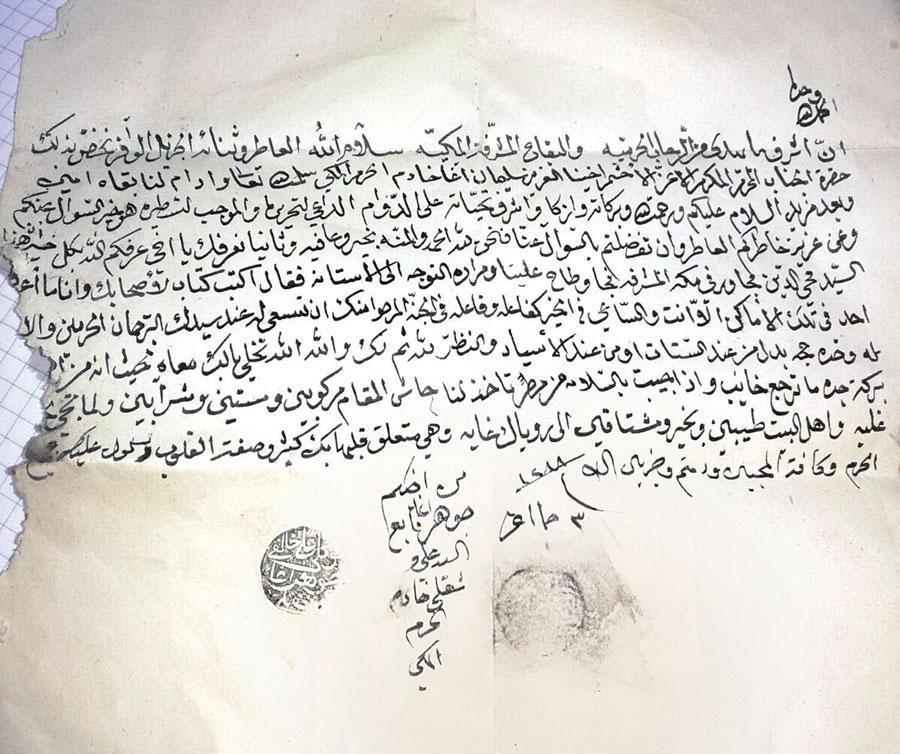
Ongoing restorations at Topkapı Palace have unearthed never-before-seen silver and gold coins, jewelries, talismans, amulets and letters. But one mysterious finding amongst others was an encrypted letter dating back to 1871, carrying the seal of Cevher Agha, also known as the Dârüssaade Ağası, the chief eunuch of Sultan Abdülaziz’s harem, found in a closet at the harem of the palace.
The harem, or the seraglio, is the most intimate section of a palace, where Ottoman sultans, their wives or concubines and children lived. Women like Hürrem, Kösem, Nurbanu and Gülfem Hatun all trained to become their sultans’ most “favorite” concubine within this harem throughout the centuries, with some even emerging out of slavery and becoming the sultans’ wives.
The seraglio, where odalisques and sultans’ sons and wives were also educated, draws many domestic and foreign tourists; the reason mostly being the international popularity of Turkish soap operas about the Ottoman Empire.
With 400 rooms, the seraglio was home to nearly 1,200 people. Restorations have been continuing in the seraglio since 2010 and the cost is believed be 100 million Turkish Liras. Reinforced concrete additions that were made in the 1940s are being cleaned one by one.
Letter of Cevher Agha
Among the findings, the most mysterious and interesting ones were a letter and envelope, found in two separate places in the harem.
Found on the third floor of the Karaağalar Mescidi (the Mosque of the Black Eunuchs), the envelope was written in the Ottoman language addressed to an emperor as “Azimetlü, veliy’ül azim efendim hazretlerine.”
There is no date indicated on the envelope and for which sultan it was written is not known. But the envelope has been registered in the inventory of the museum, waiting to be solved.
The sealed and signed letter, however, found underground in a room in the apartment of the Kızlar Ağası (Chief Black Eunuch), dates back to July 21, 1871.
Some parts of the letter, which carries the seal of Cevher Agha, are encoded. Cevher Agha served for Pertevniyal Sultan, the mother of Sultan Abdülaziz. After Abdülaziz became a sultan, he was appointed as head eunuch of the seraglio. One day after Abdülaziz was dethroned in 1876, he was discharged. The head eunuch was the closest person to the sultan and his family.
Letter cannot be decoded
In order to find out the content of the letter sent to Cevher Agha, officials have sent it to the Arabic language department of two universities. A translation office and an Arabic-speaking guide have also read the letter. But they’ve said some words cannot be solved, stressing that the letter may have been encrypted.
At first glance, the letter, sent to a person named “Süleyman Agha” by Cevher Agha from Mecca, appears to be written to ask about someone. But in another part of the letter, a person named Muhittin Hoca who wants to come to Istanbul is mentioned, and Süleyman Agha is asked to help and guide him.
But the letter is still a mystery. Who were Süleyman Agha and Muhittin Hoca? Why did the latter want to come to Istanbul? These questions await answers from historians.

Spells, talismans
During the restorations, other intriguing items were found underground and in old closets. As experts cleaned the dust off, they uncovered more than 100 silver and gold coins with the seal of Mahmud II, the father of Abdülaziz. Jewelries such as earrings, rings, and necklace pieces along with everyday items like scissors, keys, needles and buttons were found, too.
Cloth pieces that fell behind the closets, slippers without their pairs and embroidered dress pieces were also among the items found along with the letters, amulets, talismanic writings and written spells. Also among the findings, the purpose and meaning behind an amulet with Arabic text on it is unknown, but it still has its key attached to it.
On top of the door of a closet was a spell with a cut nail and tooth covered with a piece of cotton.